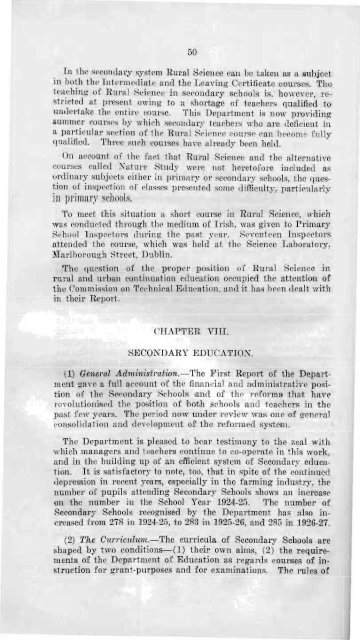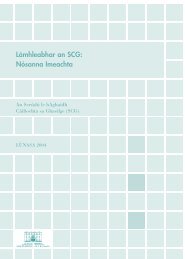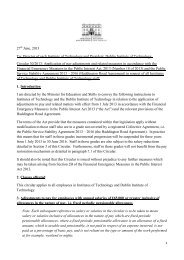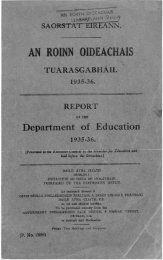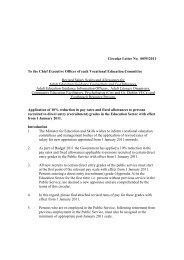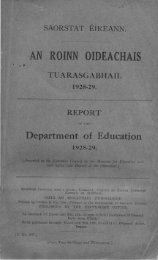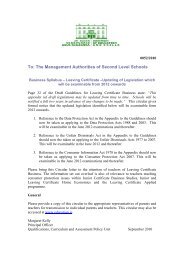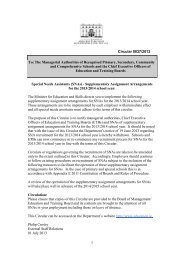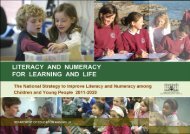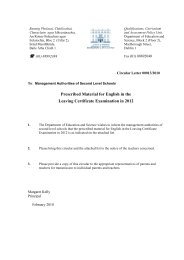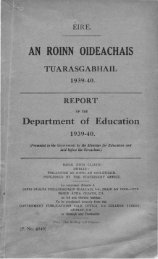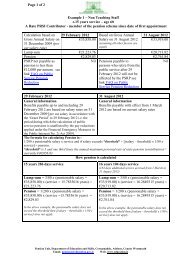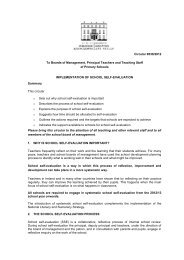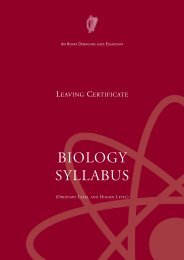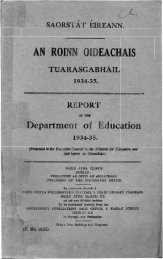1925-1926-1927 - Department of Education and Skills
1925-1926-1927 - Department of Education and Skills
1925-1926-1927 - Department of Education and Skills
- No tags were found...
You also want an ePaper? Increase the reach of your titles
YUMPU automatically turns print PDFs into web optimized ePapers that Google loves.
50In the secondary system Rural Science can be taken as a subjectin both the Intermediate <strong>and</strong> the Leaving Certificate courses. Theteaching <strong>of</strong> Rural Science in secondary schools is, however, restrictedat present owing to a shortage <strong>of</strong> teachers qualified toundertake the entire course. This <strong>Department</strong> is now providingsummer courses by which secondary teachers who are deficient ina particular section <strong>of</strong> the Rural Science course can become fullyqualified. Three such courses have already been held.On account <strong>of</strong> the fact that Rural Science <strong>and</strong> the alternativecourses called Nature Study were not heret<strong>of</strong>ore included asordinary subjects either in primary or secondary schools, the question<strong>of</strong> inspection <strong>of</strong> classes presented some difficulty, particularlyin primary schools.To meet this situation a short course in Rural Science, whichwas conducted through the medium <strong>of</strong> Irish, was given to PrimarySchool Inspectors during the past year. Seventeen Inspectorsattended the course, which was held at the Science Laboratory,1.iIarlborough Street, Dublin.,The question '<strong>of</strong> the proper position <strong>of</strong> Rural Science inrural <strong>and</strong> urban continuation education occupied the attention <strong>of</strong>the Commission on Technical <strong>Education</strong>, <strong>and</strong> it has been dealt within their Report.CHAPTERVIII.SECONDARYEDUCATION.(1) Geneml Administmtion.-The First Report <strong>of</strong> the <strong>Department</strong>gave a full account '<strong>of</strong> the financial <strong>and</strong> admini trative position<strong>of</strong> the Secondary Schools <strong>and</strong> <strong>of</strong> the reforms th3Jt haverevolutionised the position <strong>of</strong> both schools <strong>and</strong> teachers in thepa t few years. The period now under review was one <strong>of</strong> generalconsolidation <strong>and</strong> development <strong>of</strong> the reformed system.The <strong>Department</strong> is pleased to bear testimony to the zeal withwhich managers <strong>and</strong> teachers continue to co-operate in this work,<strong>and</strong> in the building up <strong>of</strong> an efficient system <strong>of</strong> Secondary education.It is satisfactory to note, too, that in spite <strong>of</strong> the continueddepression in recent years, especially in the farming industry, thenumber <strong>of</strong> pupils attending Secondary Schools shows an increaseon the number in the School Year 1924-25. The number <strong>of</strong>Secondary Schools recognised by the <strong>Department</strong> has also increasedfrom 278 in 1924-25, to 283 in <strong>1925</strong>-26, <strong>and</strong> 285 in <strong>1926</strong>-27.(2) The Ottrriculu11t.-The curricula <strong>of</strong> Secondary Schools areshaped by two conditions-Cl) their own aims, (2) the requirements<strong>of</strong> the <strong>Department</strong> <strong>of</strong> <strong>Education</strong> as regards courses <strong>of</strong> instructionfor grant-purposes <strong>and</strong> for examinations. The rules <strong>of</strong>


